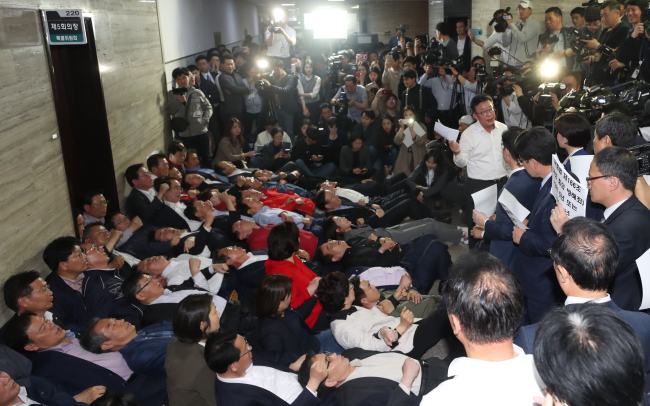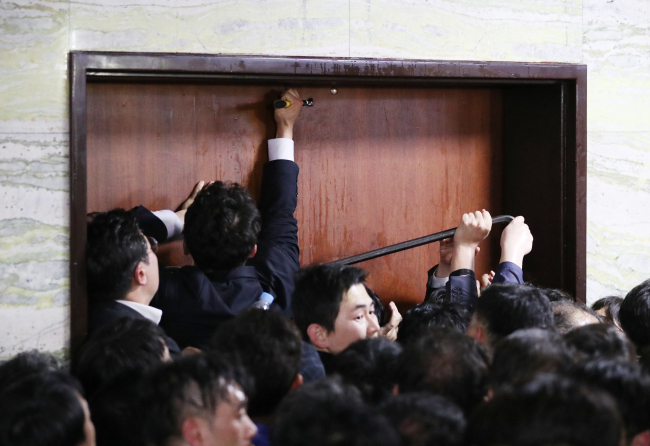[KH Explains] What is behind political impasse, violence at National Assembly?
By Kim Bo-gyungPublished : April 29, 2019 - 16:10
To list but a couple remarkable incidents, Rep. Chae Yi-bae of the minor opposition Bareunmirae Party was locked in his office for six hours by Liberty Korea Party officials and called police for help, while National Assembly Speaker Moon Hee-sang was hospitalized for hypoglycemic shock following a quarrel and physical standoff with Liberty Korea Party lawmakers who swarmed into his office.
At the center of the disarray is an electoral reform bill that would shake up the political landscape if passed, increasing the number of Assembly members elected by proportional representation from 47 to 75.
The ruling party and three minor opposition parties are keen on putting the bill on the fast track for it to take effect in time for next year’s general election on April 15. The main opposition Liberty Korea Party stands vigorously opposed.

The ruling party and three minor opposition parties last week agreed to change the mixed-member proportional representation system, in which the total number of seats would remain unchanged at 300. A total 28 constituency seats were reduced in line with the increase in proportional representation.
If the special parliamentary committee on political reform agrees to fast-track the bill, it would lay the ground work for change to the legislature’s election system in 31 years.
What is at stake?
According to Rep. Sim Sang-jung of the minor Justice Party, who chairs the political reform committee, the new electoral system would bolster the representation of small groups whose voices have been underrepresented. This would ultimately bring about a significant change to a political landscape that has largely been dominated by the ruling and main opposition parties, and pave the way for greater representation of smaller parties.
According to a mock general election conducted by local pollster Realmeter, the number of parliamentary seats claimed by the ruling party and main opposition party would remain mostly unaffected, proving beneficial for the Justice Party.
The number of the ruling Democratic Party of Korea’s seats in the parliament would rise to 131 from the current 128 seats, while main opposition Liberty Korea Party’s seats would remain unchanged at 113, according to the mock general election. The results were based on the ruling party’s support rating of 37.2 percent and the main opposition’s 32.2 percent.
Given the support rating of the minor opposition Bareunmirae Party stands at 5.7 percent, its parliamentary seats would drop to 19 from the current 29. That would mean it could no longer hold the negotiating group status that gives it certain rights in the Assembly.
On the other hand, the Justice Party will see a boost to 15 seats from the current five, based on its 6.7 percent support rating.
The Party for Democracy and Peace, with 1.9 percent support, would lose a seat to stand at 13, mock election results showed.
“The most important element in this brawl is the adoption of the mixed-member proportional representation system. For the most part, this is unfavorable for the ruling and main opposition parties, and advantageous for minor parties -- specifically the Justice Party that has a strong voter base and high approval rating,” Park Sang-byoung, a political analyst and professor of Inha University’s Graduate School of Policy Science, told The Korea Herald.
“Given the current situation, there is a high chance that a new centrist party could be formed. This is the worst-case scenario for the Liberty Korea Party, which is why it is making all-out efforts to hold on to its vested interests.”
Park added that the rise of the Justice Party and a new centrist party is likely to weaken the position of the Liberty Korea Party, which he said risks being labeled far-right because of the the rise of hardliners and supporters of ousted President Park Geun-hye within the party.

In the face of this looming risk, the Liberty Korea Party argues the total number of Assembly seats should be reduced to 270, with all members elected to represent single-member constituencies.
Besides the electoral reform bill, the ruling and three minor opposition parties have also agreed to fast-track the establishment of an independent investigative body targeting high-level government officials, the adjustment of investigative authority between police and prosecution and the revised Public Prosecutors’ Office Act.
What happens next?
The electoral reform bill can be put on the fast track with backing from over 11 legislators in the 18-member special committee.
Justice Party Rep. Sim Sang-jung said that, excluding the six Liberty Korea Party lawmakers, the rest are on board with the reform bill and the committee is giving the Bareunmirae Party time to settle its internal dispute.
Once a bill is fast-tracked, it is reviewed by the relevant committees and put to a vote at a parliamentary session within 330 days.
The National Assembly speaker can use his discretion to speed up the process to 180 days.
By Kim Bo-gyung (lisakim425@heraldcorp.com)


















![[Today’s K-pop] Treasure to publish magazine for debut anniversary](http://res.heraldm.com/phpwas/restmb_idxmake.php?idx=642&simg=/content/image/2024/07/26/20240726050551_0.jpg&u=)